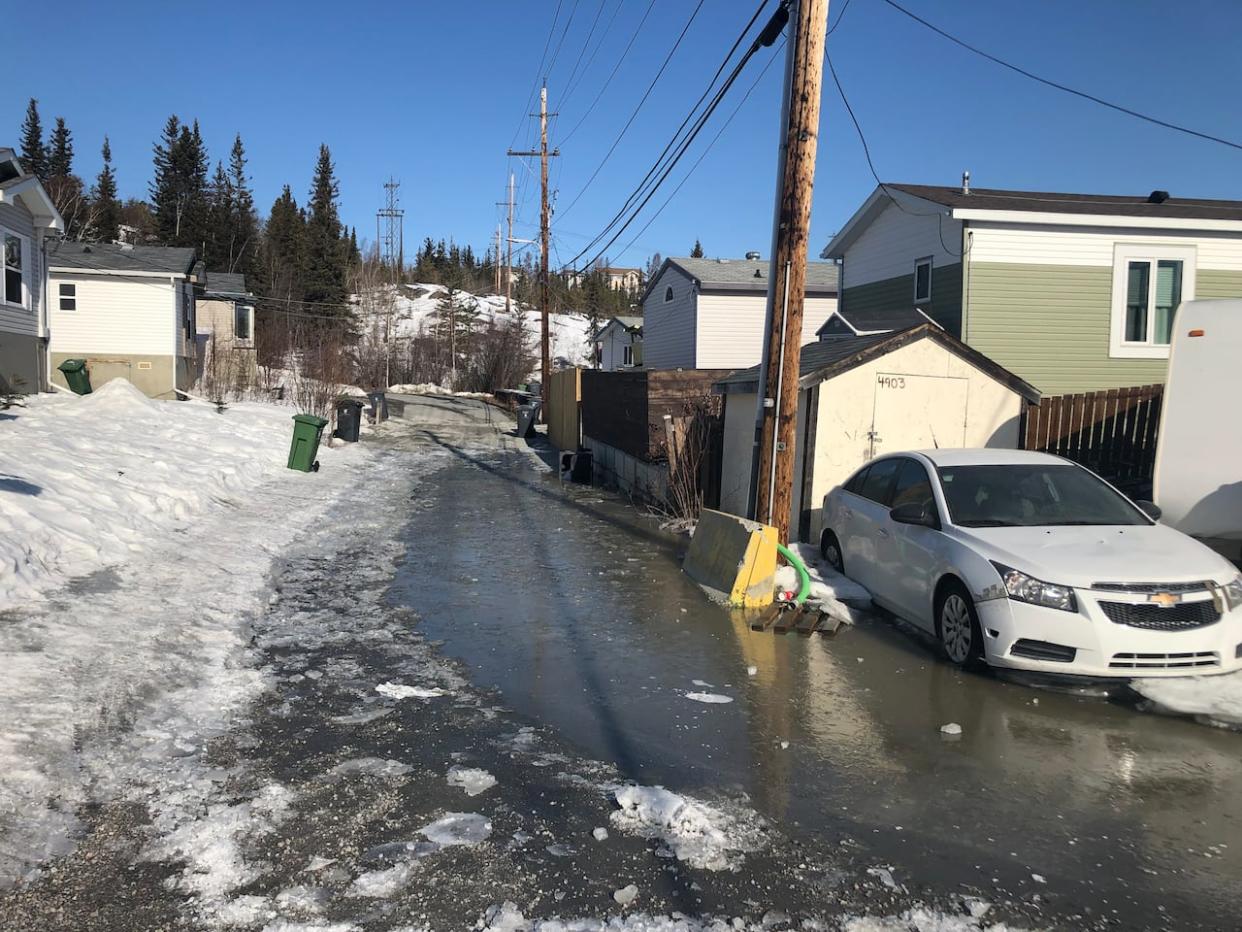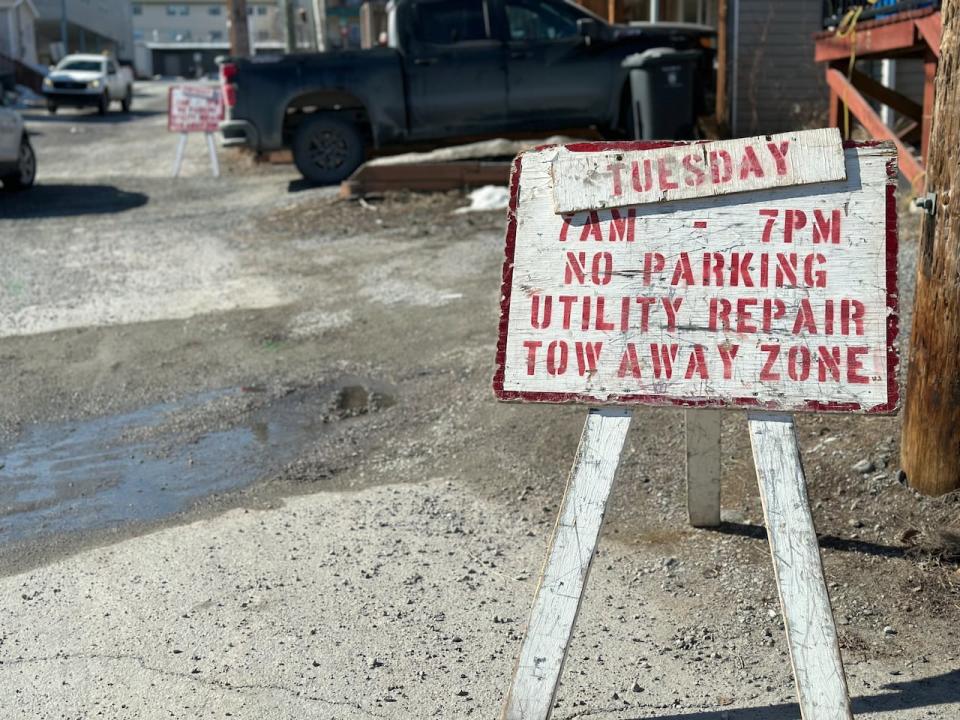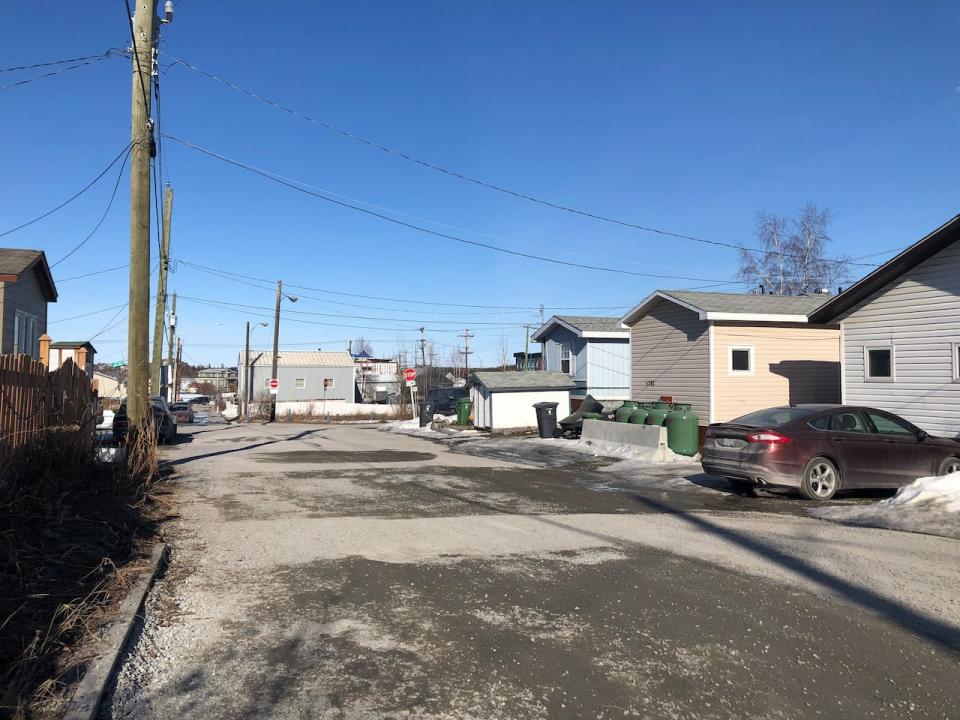City's plan for leaky water lines not enough, says Yellowknife resident

A Yellowknife resident worries the city's plan to prevent water infrastructure from leaking in her neighbourhood doesn't go far enough in addressing the core issues.
"I think that they need to do a serious survey,"said Julia Kusyj, who has lived in the area between Old Town and Niven for around 20 years.
The area experienced seven broken pipes since February, including a major one in March that created a large puddle that's still there. The area is also seeing slumping and heaving on the roads, making it difficult to drive there.
The city's director of public works, Chris Greencorn, told CBC News last week that the city used exploratory video, which found the water main to be in good shape, while individual pipes that connect to homes were being damaged from the shifting. The plan is to replace those pipes.
But Kusyj worries the issue is larger and that more exploration needs to be done.
"I saw something mentioned about cameras, but I think they need to do a pretty extensive search. The road behind me has been sinking for years, but it has just escalated over the past several," Kusyj said.
Abby Schelew, a spokesperson with the City of Yellowknife, said in an email to CBC News that what the city is attempting to do is provide some immediate relief to residents, as even planning for a full-scale underground project takes years.
"Full excavation and replacement (or regrading) of water/sewer mains cannot occur without detailed design and tender processes, while individual (private) service replacement can," she wrote.

A sign on 49A Avenue in Yellowknife notifying residents of a utility repair. (Graham Shiskov/CBC)
City doing its best to offer immediate relief
Schelew sent CBC News a detailed email on the process for major infrastructure projects in the city.
"City staff are aware of the concerns and frustrations of 49A Avenue residents, and we understand that water breaks in cold temperatures are a major challenge for all parties involved," she wrote.
"When weighing all the considerations, we did not want the residents of the area to wait several years for the required repairs to be completed."
In the email, Schelew noted that the 49A Avenue area was in the city's 2022 budget, to be repaired in 2024.
"Since then, city staff have had to contemplate significant inflationary increases that are impacting all sectors of construction," Schelew wrote.
"The events previously mentioned, combined with a job action (strike/lockout) and the wildfire/evacuation response in 2023, have impacted our schedules and ability to get work plans completed."
An underground project of that magnitude involves seven steps and takes about five years, she said, and involves creating a plan and issuing tenders.
When the video inspection was completed and it found that the water main in the neighbourhood was in good shape, the city determined some work could be completed, Schelew said.
"Due to the already established priority of 49A Avenue, plus the number of private water service breaks in the area over time and during 2024, and the addition of a water main break, the City decided to provide some relief for the residents of the area ahead of the seven step process above."
If the water main needed to be replaced, the seven steps would need to be taken into account.

A photo of 49A Avenue in Yellowknife, where work will be done this summer. (Luke Carroll/CBC)
Seasonal frost action
Ed Hoeve is a Yellowknife geotechnical engineer who specializes in foundations and earth work, which is the interaction between infrastructure and the ground.
He says he doesn't have site-specific knowledge of the neighbourhood between Old Town and Niven, and what's happening there. He also said pipes leading to homes freezing is a common cause of leaks in the winter.
But Hoeve says another possibility for what's causing the leaks could be seasonal frost, which is frost that forms in the first few metres of underground soil in the cold months and thaws in warm weather, shifting the ground beneath it.
"That's kind of when the ground freezes in the fall and early winter it heaves, and in a certain type of ground, usually clay soils. In Yellowknife in particular it's the clay soil that's bad for frost heave and that can stress pipes as well."
He says if this is the case, there are two options available. One is to dig out around the pipes and fill it with a different material.
"Remove some of that problematic soil and replace it with a stable soil. So, like gravel," he explained.
Hoeve said this has been used in Yellowknife before with mixed results.
The other option is similar: burying insulation in the ground above the pipes which also prevents the formation and thawing of seasonal frost.
Schelew, the city spokesperson, said in an email that professional engineering firms are required to complete a full geotechnical analysis of the area to determine what can be done to attempt to stabilize infrastructure.
But she added it's "nearly impossible to predict the nature and forces associated with subsurface movement (heaving and/or settling)."

